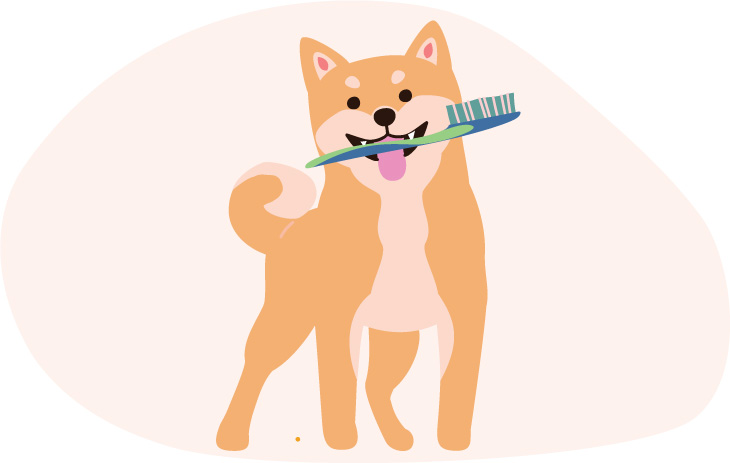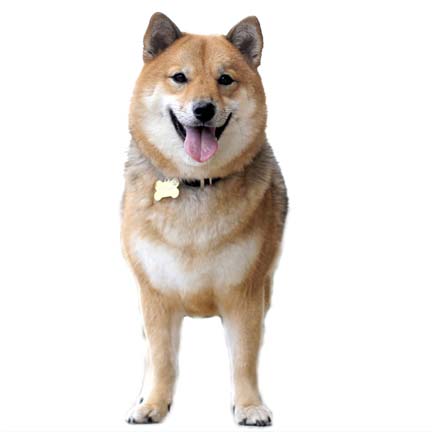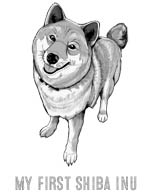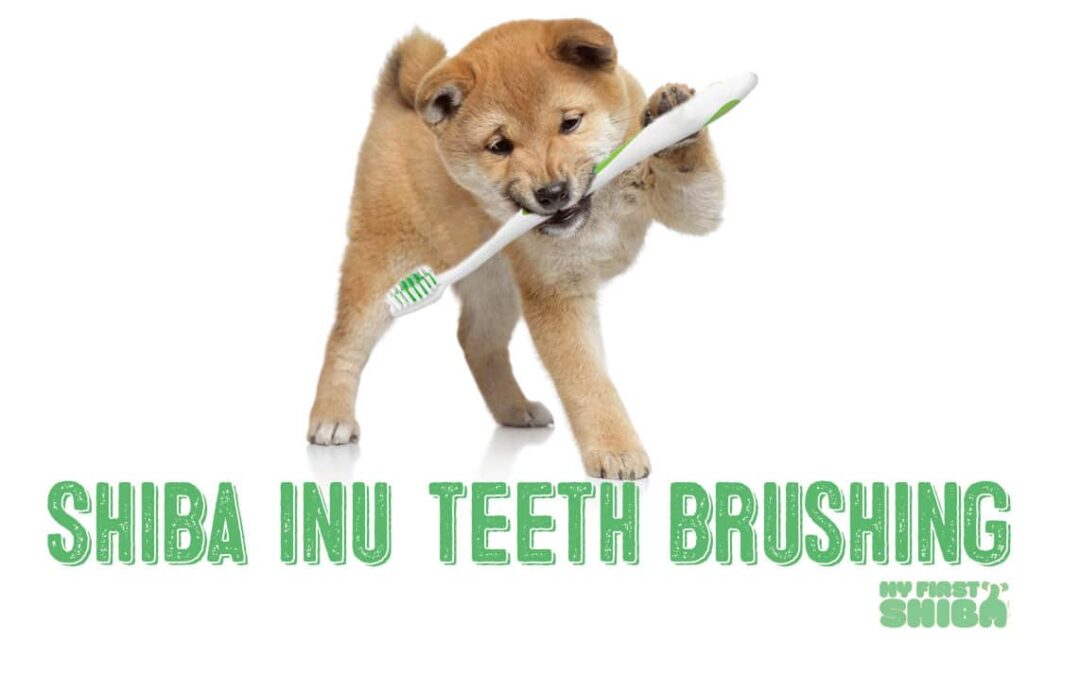Last Modified: 11/16/2023
On occasion, our posts contain affiliate links. However, we only recommend products that we truly believe in. For more information, visit my privacy policy page.
Phew, this website is a labor of love and largely a one-woman show so unless indicated, all articles written by J.Tsukamoto
Taking care of Shiba Inus can be a lot of work at times - especially if you have more than one!
It's common for many Shiba Inu owners to not think about brushing their Shiba's teeth because, well, brushing a dog's teeth has never been common in the past.
However, the tremendous benefits of good oral health teeth brushing brings may make your realize that the extra effort and time will be more than worth it in long run.

Dental Disease In Shiba Inus Can Be Prevented
Did you know that dental disease in dogs is the most common and completely preventable clinical condition affecting dogs and cats?
In fact, by three years of age almost 85% of all dogs show some form of dental disease.
Unfortunately, canine dental care is also the most OVERLOOKED area of canine health.
A study by the American Hospital Association discovered that two-thirds of dog and cat owners DO NOT take care of their animals' teeth.
If so, here are some startling facts about the seriousness of periodontal disease in dogs.
Dental diseases including periodontal disease are the most commonly undetected and untreated diseases in canine health.
Yet these dental diseases contribute to severe pain, tooth loss, and a reduction in your dog's overall health.

Two Shiba Inus showing off their pearly whites and negotiation tactics
2/3 Of Dog Owners Do Not Brush Their Dog's Teeth
Just as how human studies confirm a direct correlation between dental health and overall health - veterinarian studies have also confirmed this fact.
A study by Larry Glickman, a professor of epidemiology at Purdue University, found a statistical link between canine periodontal disease and heart disease in dogs.
In addition to affecting your dog's cardiovascular system, other studies have found that periodontal disease can also affect your dogs kidneys and liver. (Pavlica, Petelin et al. 2008)
Dental Disease and Diabetes in Dogs
Dental disease may also contribute to diabetes in dogs.
Jean Joo an oral veterinarian surgeon stated that chronic inflammation from dental disease eventually leads to insulin resistance and diabetes.
In more than a few cases she has observed a link between fetid dog mouths and hard-to-control diabetes.
After cleaning the dog's teeth, Joo noticed a dramatic drop in insulin needs for a number of these dogs within a few weeks. Read more here.
Neglecting your dog's oral health will lead to serious consequences in the long term. Fortunately, many owners who were previously unaware about these facts, can reverse dental disease by first educating themselves on the topic.
A Simple Overview Of Dental Disease In Dogs
Bacteria. Bad bacteria.
Bad bacteria is the root cause of periodontal disease - the most serious form of dental disease. First, bacteria in your dog's mouth causes plaque to form on your dog's teeth. This plaque eventually turns into tartar which in itself is not the cause of periodontal disease but rather a contributor.
Real problems start when the growing tartar buildup gets under your dog gums line.
Here, more bad bacteria will proliferate and secrete toxins that cause tissue damage and eventually tooth loss.
These toxins will also cause your dog's immune system to attack not only the bad bacteria, but also good healthy tissue in your dogs gum.
When enough damage has been done to your dogs oral cavity, bad bacteria can enter your dog's bloodstream and travel through the rest of your dog's body.

Why Daily Brushing Is Crucial
Hopefully, all of the info about the consequences of dental disease will incite you to take proactive steps in maintaining your dog's oral health. Daily brushing is the ONE oral maintenance task that will provide the most benefit for your dog's dental health.
This is because the bad plaque bacteria earlier mentioned takes approximately 24 -36 hours to recolonize your dog's teeth.
While brushing your dog's teeth two to three times a week is better than nothing, a quick and simple daily brushing can have so much more benefits for your dog's long term health. The brushing session doesn't have to be long - a minute or so is sufficient.
Signs Of Oral And Dental Disease In Dogs
One of the reasons that dental diseases in dogs go unnoticed is because most dogs don't express pain or discomfort like we do.
By the time most dental diseases are diagnosed, the severity of the disease is quite high. For this reason it is critical to have your vet do dental checks at least once a year.
Symptoms of Dental Disease:
- Bad breath
- Difficulty eating
- Loose / missing teeth
- Bleeding, redness, or swelling near gums
- Loss of appetite
- Taking food from bowl and eating somewhere else
- Tartar
- Pawing at the mouth
Starting Your Shiba's Dental Maintenance Plan
Dental disease in all dogs can lead to serious consequences. Luckily, dental disease can be prevented with proper care and maintenance.
Before beginning any home care program, you should take your Shiba to the vet for a complete dental exam. Deep cleaning may be suggested by your vet if necessary.
Once your vet has cleaned your Shiba's teeth and treated any dental issues - you will now have a dog with a clean dental "slate" to start with.
By far, the best dental maintenance you can do for your dog is daily teeth brushing. Daily brushing will keep bad bacteria away and help keep your dog's gums strong and healthy.
What Type Of Toothbrush Should I Brush My Dog's Teeth With?
The most important factor in choosing a dog toothbrush is the size. There are a number of manufacturers who make toothbrushes especially for dogs. These brushes are soft-bristled and come in a variety of sizes and styles.
A lot of these brushes feature angled heads and many designs are dual-headed with a small headed brush on one side and a slightly larger headed brush on the opposite side.
You can also use human toothbrushes for dogs provided that they are the soft-bristled and the right size. The Veterinary Oral Health Council (VOHC) approves child-sized toothbrushes for the use on all dogs.
Since the main method of plaque removal comes from the mechanical brushing movements during brushing - electronic, powered toothbrushes are an even better choice of dog toothbrush.
Be sure that the bristles are soft and the brush head is the right size.
Some dogs that barely tolerate normal tooth brushing may not accept electronic tooth brushing readily. Gradually introducing the electronic toothbrush in short sessions over a period of time is recommended.
Types Of Dog Toothpastes
Dog toothpastes typically fall into two categories - enzymatic and non-enzymatic. Both types can work well for dogs. When choosing a dog toothpaste, it is essential to find a dog toothpaste that your dog enjoys tasting.
Dog toothpaste should be non-foaming because dogs will not spit out the toothpaste. Additionally, foaming creates an unpleasant sensation that your dog will not enjoy.
Since your dog will be swallowing the toothpaste, it would be best to choose a toothpaste with as few unnecessary ingredients as possible.
Enzymatic Dog Toothpastes
Most enzymatic toothpastes contain enzymes such as glucose oxidase and lactoperoxidase. Once these enzymes are exposed to oxygen and glucose they generate hydrogen peroxide that fights plaque and tartar.
Non-Enzymatic Dog Toothpastes
Non-enzymatic dog toothpastes commonly contain silica, emulsifiers, and all-natural ingredients.
Silica serves as a mild abrasive for removing plaque and tartar. Emulsifiers help keep the dog toothpaste uniform while also helping to break down plaque and tartar.
Some dog toothpastes contain natural ingredients derived from plant extracts such as tannic acid, peppermint, and spearmint leaf oil. Tannic acid is used to help soften receding gums and protect gums from further damage due to improper chewing.
To read recommendations for dog toothpastes, scroll to the bottom of this page.
Homemade Dog Toothpaste
Making your own dog toothpaste is a great way to ensure that you are using high quality, natural ingredients on your dog. Many ingredients in homemade dog toothpaste such as coconut oil can also improve other aspects of your dog's health.
Because your dog ingests toothpaste, using natural ingredients free of preservatives is a great idea.
The most important aspect of dog teeth brushing is the actual mechanical brushing on the dog's teeth - not the actual toothpaste. Dog toothpaste is mainly used to provide flavor for the dog so that the dog accepts teeth brushing.
While ingredients like enzymes do help tartar removal - the lion's share of the work is accomplished with the simple act of brushing.
Is Homemade Dog Toothpaste Better Than Store Bought Dog Toothpaste?
While there is no definitive study to indicate which type of toothpaste is better - many informed dog owners have been choosing to go the natural route in various aspects of their dog's care.
Human studies have confirmed that the use of dentifrice (toothpaste) does not contribute to the instant plaque removal while brushing. Instead, the actual mechanical movements of the toothbrush on the teeth is the main factor in removing plaque.
This information indicates that the main purpose of dog toothpaste is to provide flavor so that the dog accepts tooth brushing. With this knowledge, homemade toothpaste is a fine alternative to store bought toothpaste.
However, avoid using baking soda in homemade toothpastes for dogs because it contains too much salt.
Can I Use Human Toothpaste On My Dog?
No, never. Human toothpaste contains fluoride which is toxic to dogs. Dogs and cats are not as susceptible to cavities as humans are. Therefore the ingredients in dog toothpaste are not targeted at solely fighting cavities.
Instead dog toothpaste is used mainly to fight and prevent tartar as well as helping dog owners to be able to brush their dog's teeth with little resistance.
How To Brush Your Shiba's Teeth Properly
The best way to get your dog used to daily brushing is to start early in puppy hood. The key to getting your puppy or adult dog used to brushing is patience and positive reinforcement.
Introducing Your Shiba To Dog Toothpaste and Toothbrush
When first introducing your Shiba to dog toothpaste it is important to make sure you have a flavor that your Shiba enjoys (chicken, beef, peanut butter, etc).
Start by letting your dog taste the toothpaste. Praise and pet your Shiba during this time to make the experience positive.
Next, you can simply use your fingers and rub the outer surfaces of your dog's teeth with some of the toothpaste.
Hopefully, your Shiba is still enjoying the experience. Continue to give praise and see how long more your dog can tolerate the teeth rubbing.
When you sense that your Shiba is beginning to get agitated, stop the teeth rubbing and end the session positively. Give your pup just a bit more dog toothpaste to end the experience with a positive taste.
One Step At a Time
Continue introducing your Shiba to the toothpaste and tooth rubbing for a few more sessions. If your dog seems comfortable with the teeth rubbing, you can start introducing a dog toothbrush into the session.
Start with slow and gentle movements at first. Increase brushing speed slowly and stop when your dog gets noticeably agitated. Remember to keep the session highly positive and tension-free.
Once your Shiba is accustomed to teeth brushing, try to maintain a daily brushing schedule - even if the brushing lasts less than a minute. Daily brushing can really keep bacteria levels in your dog's mouth down.
During brushing, the bristles of the brush should be at a 45 degree angle to the surface of the tooth. Use quick, circular brushing motions on your dog's canine and front molar teeth. Try to concentrate in the area near your dog's gum so you can reach the gingival sulcus (under the gums) which is an area where tartar forms quickly.
Electronic Dog Toothbrushes For Even Better Brushing
If you are fortunate and have a dog that tolerates dog teeth brushing well, you may want to consider using electronic toothbrushes for even better cleaning.
Just as in the case that electronic toothbrushes are better than manual toothbrushes for humans, using these types of toothbrushes are more beneficial for your dog as well. Some dogs may not like the noise and vibration of electronic toothbrushes at first - so start slowly and use the same introduction techniques discussed earlier.
Options For Shibas That Refuse To Allow Teeth Brushing
There are some Shibas that will never willingly let you brush their teeth no matter what methods you try. This could be due to severe anxiety, phobias, or behavioral disorders.
In these cases, these dogs would likely have to get their teeth cleaned by a veterinarian on a more frequent basis.
Another option would be to get help from a canine behavorist.
There are products that can help with plaque build-up which dog owners could use in place of brushing.
Such products include dental gels, liquids or chews which contain chlorhexidine. Chlorohexidine has been scientifically proven to reduce plaque accumulation in various scientific trials.
Various chew products made specifically for oral health can also help keep plaque and tartar at bay.
In studies, soft, raw marrow bones have shown to help remove plaque causing bacteria in dogs. However, dog owners need to supervise their dogs carefully when any type of bone is given.
Hard, brittle bones can cause tooth damage and fracture and should never be given to dogs.
OUR PICKS FOR BEST DOG TOOTHPASTES:
Sentry Petrodex Natural Toothpaste
We like Sentry Petrodex Natural Toothpaste because it contains no artificial preservatives or additives.
Instead, natural silica in the formula acts as a mild abrasive to aid in plaque removal.
The peanut butter flavor is well tolerated in most dogs. Sentry Petrodex also has beef and chicken flavored dog toothpaste for dogs who dislike or are allergic to peanut butter. However, those formulas do contain more ingredients than this formula.
Check the latest price of Sentry Petrodex Natural Toothpaste here.
Virbac C.E.T. Enzymatic Toothpaste
The Virbac C.E.T. Enzymatic Toothpaste is another great choice in toothpastes for dogs.
This enzymatic dog toothpaste contains two types of enzymes - glucose oxidase, and lactoperoxidase. In the presence of oxygen and glucose, these enzymes form hydrogen peroxide which targets plaque and tartar build-up.
This enzymatic dog toothpaste comes in 5 flavors - beef, poultry, seafood, malt, and vanilla-mint. Our dog's favorite flavors are beef and poultry.
In addition to enzymes, this dog toothpaste also has silica which is a natural abrasive that helps to scrub off plaque and tartar.
Check the latest price of Virbac C.E.T. Enzymatic Toothpaste here.
Enzadent Pet Toothpaste: Dogs & Cats Poultry Flavor
Enzadent Pet Toothpaste is another one of our favorite dog toothpastes.
The best feature about this toothpaste is that it contains three different types of enzymes instead of the usual one or two.
Most dogs really seem to love the flavor of this toothpaste. During testing, I used three of the dog toothpastes mentioned in this article on my dogs at the same time. Flavor wise, they always seemed to enjoy this toothpaste the best. They equally liked the other two.
The only downside to this toothpaste is that it is not always easy to purchase. My brick and mortar pet store sometimes has this toothpaste available, though not always.
Amazon usually has this toothpaste but sometimes the stock runs out and may not be available for some time.
Check the availability and latest price of Enzadent Pet Toothpaste: Dogs & Cats Poultry Flavor here.
Thanks for visiting Myfirstshiba.com! We do our very best in providing our readers with awesome content about our beloved Shiba Inu breed. Some of our articles include reviews and recommendations to our favorite products. We do earn commissions from affiliate links that help support our work and mission. Thanks again for visiting. Shiba Kisses To All!




